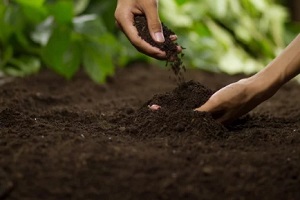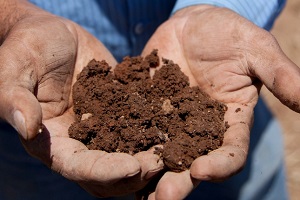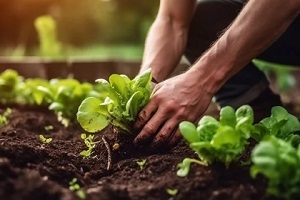 Gardeners know that the ultimate secret to having thriving plants often lies beneath just the surface of their soil. It’s not just about watering and sunlight; the soil plays a starring role. But not all plants crave the same type of ground. Some prefer it light and airy, while others want it dense and rich.
Gardeners know that the ultimate secret to having thriving plants often lies beneath just the surface of their soil. It’s not just about watering and sunlight; the soil plays a starring role. But not all plants crave the same type of ground. Some prefer it light and airy, while others want it dense and rich.
Instead of endlessly searching the market for the perfect blend, why not craft your own? Creating your own custom soil mix allows you to meet the specific needs of your plants and optimize their growth potential.
This article will guide you step-by-step on how to craft the perfect soil mix for your garden’s unique requirements, so prepare to get your hands a little dirty and your plants a lot happier!
Understanding Your Plants’ Needs
Every plant species has its own unique needs and soil preferences, which is where creating a custom soil mix can be highly beneficial. Cacti and succulents, for instance, thrive in fast-draining soil, while ferns tend to prefer a moisture-retentive blend. Before creating your custom mix, try to research the specific requirements of the plants you’re catering to.
Base Ingredients
- Peat Moss or Coco Coir: These are excellent for water retention. Coco coir is a sustainable alternative to peat moss and offers comparable moisture retention and soil aeration benefits.
- Compost: It’s a rich organic material that introduces essential nutrients to the soil.
- Perlite: White, lightweight particles that improve drainage and aeration.
- Vermiculite: Another lightweight mineral, but it retains more water than perlite.
Customizing Your Soil
- For Succulents and Cacti: Combine 2 parts sand, 2 parts potting soil, and 1 part perlite or pumice. This ensures quick drainage, which these plants require.
- For Houseplants: A general blend consists of 1 part peat moss or coco coir, 1 part perlite, and 1 part potting soil. Adjust based on specific plant needs.
- For Vegetable Gardens: Combine 1 part compost, 1 part peat moss or coco coir, and 1 part vermiculite. This provides a nutrient-rich environment for growing veggies.
- For Orchids: They require a very particular mix, often consisting of bark chips, charcoal, and coarse perlite.
- For Acid-Loving Plants (like blueberries or azaleas): Blend 1 part conifer bark, 1 part sphagnum peat moss, and 1 part sand or perlite. The acidic nature of sphagnum peat moss caters to these plants’ specific needs.
Enhancing the Nutrient Profile
Soil is more than just dirt; it’s a vibrant ecosystem teeming with life and nourishment. However, even the best soils can benefit from a nutrient boost, especially when catering to specific plants with unique requirements. Here’s how to enrich your custom soil mix:
 Worm Castings: A veritable gold mine for gardeners, worm castings introduce beneficial microbes and significantly improve the soil’s water retention capability. They also offer a gentle, time-released nutrient source that plants love.
Worm Castings: A veritable gold mine for gardeners, worm castings introduce beneficial microbes and significantly improve the soil’s water retention capability. They also offer a gentle, time-released nutrient source that plants love.- Bone Meal: This is an excellent source of slow-release phosphorus. Phosphorus plays a vital role in the formation of DNA, RNA, and enzymes, and it supports energy transfer in plants. It’s particularly beneficial during blooming and aids in robust root development.
- Blood Meal: Rich in nitrogen, blood meal promotes rapid, green growth of foliage. It’s an organic alternative to synthetic nitrogen sources and is especially useful for leafy vegetables and plants.
- Fish Emulsion: Think of this as a nutrient-packed smoothie for your plants. A liquid fish emulsion is a quickly absorbed source of nitrogen and other essential nutrients. Besides nitrogen, it contains trace amounts of various other nutrients, making it an all-around supplement.
- Kelp Meal: Derived from dried seaweed, kelp meal is a gentle source of potassium. It promotes plant health, aids in fruit formation, and can even make plants more resistant to stresses like drought.
When integrating these enhancers, always ensure you’re following recommended application rates. Remember, while nutrients are essential, over-fertilizing can lead to ‘burning’ the plants or causing nutrient imbalances.
Make sure that you regularly observe your plants’ health and adjust their environment as needed.
Understanding and Adjusting Soil pH
Soil pH determines how well plants can take up nutrients from the soil. Some plants prefer acidic soils, others alkalines, and many fall somewhere in between.
Test Your Soil
You can purchase a soil test kit from most gardening stores. This will give you a pH reading.
Adjusting pH
- To Raise pH (make soil more alkaline): Add pulverized lime.
- To Lower pH (make soil more acidic): Add sulfur or use acidic organic matter like pine needles or sphagnum peat moss.
A Note on Soil Texture
The feel and consistency of the soil play a significant role in its performance:
- Loamy Soil: Often considered ideal for most plants, it’s a balanced mix of sand, silt, and clay.
- Sandy Soil: This has larger particles, which ensures good drainage.
- Clay Soil: This has smaller particles, which better retain water but can often be too compacted, restricting root growth.
- Silty Soil: This is soft and soapy to the touch; it retains more water than sandy soil.
When customizing your soil mix, aim for a loamy texture unless the plant has more specific needs.
Testing Water Drainage
After creating your own custom soil mix, it’s essential for you to test its overall drainage capabilities:
- Fill a plant pot with your soil mix.
- Water the soil until it’s saturated.
- Monitor how quickly the water drains.
- Adjust your mix as necessary (e.g., add more perlite for better drainage).
Storage and Longevity
 After preparing your custom soil mix, store it in a cool, dry place. If you’ve added organic fertilizers, use the mix within a year to benefit from its full nutrient profile. If you’ve prepared a mix without added nutrients, it can be stored for a longer period, but ensure it remains dry to prevent mold growth.
After preparing your custom soil mix, store it in a cool, dry place. If you’ve added organic fertilizers, use the mix within a year to benefit from its full nutrient profile. If you’ve prepared a mix without added nutrients, it can be stored for a longer period, but ensure it remains dry to prevent mold growth.
Remember, as plants grow and draw nutrients from the soil, they may require supplemental fertilization or even a refreshed soil mix over time. Regularly monitor your plants’ health and adjust their environment as needed.
Making the Best Custom Soil Mixes
When it comes to mastering gardening and landscaping, the foundation you choose to use truly matters. Your soil mix can make or break your plant’s growth, health, and overall success. If you’re seeking a trusted provider who understands the importance of quality soil, look no further than Dirt Connections.
As a premier provider of the finest bio-mix soils available, they have dedicated themselves to creating blends that cater to the diverse needs of plants. Serving the Virginia and Maryland regions with pride, their reputation speaks for itself.
You no longer need to rely on guesswork or DIY mixes when this kind of guidance and expertise is just a phone call away. For gardeners who want the best for their plants, make the connection with Dirt Connections.
Contact Dirt Connections and let them be your trusted partner and custom soil provider; reach out today at 1-703-940-9949 in Virginia or 1-301-691-3215 in Maryland, or visit them online to get started.
Summary

Dirt Connections was started with one goal in mind: providing quality residential and commercial construction services to clients on time and on budget. Reach out for more information on how we can support your next project.
For your convenience our estimates are free and by appointment. Call 703-940-9949 for a free estimate today!









































